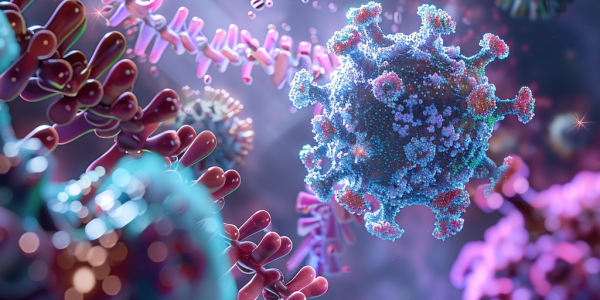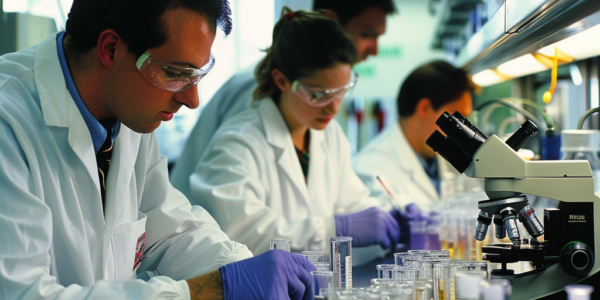The Emergence of Selectively Advantageous Instability in Biology
Discover how the concept of ‘selectively advantageous instability’ (SAI) is challenging traditional ideas of stability and evolution in biology. Professor John Tower from USC Dornsife explains how a certain level of instability in biological components can be beneficial for cells, leading to increased genetic diversity and adaptability. Learn about the dual nature of instability in biology and its implications for cellular resources and energy consumption.
Discovery of Troublemaker Platelets in Aging Population Offers New Hope for Treatment
A new study by UC Santa Cruz researchers has identified a secondary population of platelets that become hyperreactive with age, leading to increased risk of blood clotting diseases. This discovery could pave the way for more targeted medication to address these issues. Platelet dysregulation, common in older individuals, can lead to serious health problems such as strokes and cardiovascular disease.
Study Finds Removing Senescent Cells Boosts Short-Term Immune Response at Expense of Long-Term Memory
Discover how clearing senescent cells in mice can improve initial infection response but hinder immune memory development. Learn about the trade-off between short-term immune efficiency and long-term memory revealed in recent research.
Research Reveals Role of Stochastic Variation in Developing Aging Clocks
Recent research by David H. Meyer and Björn Schumacher has highlighted the role of accumulating stochastic variation in developing aging clocks, providing valuable insights into the aging process and potential treatments for age-related conditions. Their study emphasizes the significance of accurate aging clocks in assessing interventions and preventive measures for age-related diseases, shedding light on the interplay between programmed and stochastic elements in the aging process.
Study Reveals How SARS-CoV-2 Disrupts Protein Production in Infected Cells
Learn how a recent study from the University of Toronto’s Temerty Faculty of Medicine reveals how SARS-CoV-2 disrupts protein production in infected cells, shedding light on the virus’s manipulation of cellular machinery. The research, led by post-doctoral researcher Talya Yerlici and published in Cell Reports, uncovers how the SARS-CoV-2 protein Nsp1 hinders protein synthesis and impairs the cell’s defense mechanisms, creating challenges for mounting an effective immune response. Explore the potential for targeted therapies to counteract Nsp1’s effects and enhance treatment strategies for COVID-19.
Study Shows Perception of Old Age Starting Later in Life
Recent study shows that middle-aged and older adults believe old age starts later in life due to factors like increased life expectancy and later retirement age. Research indicates a clear trend of a later perceived onset of old age among later-born individuals, although the trend has slowed in recent years. The evolving societal views on aging are influenced by factors such as health, longevity, and retirement age, highlighting the dynamic nature of the concept of old age.
Study Suggests Diabetes Drug Metformin May Have Anti-Aging Effects
Recent study suggests that metformin, a common diabetes drug, may have anti-inflammatory effects that could protect against age-related diseases. The TAME Trial is investigating metformin’s role in promoting healthier aging. Individuals like Michael and Shari Cantor have reported feeling energetic and healthy on metformin, which is affordable and may have potential to extend lifespan.
Research Shows Young People May Be Ageing Faster, Leading to Higher Cancer Rates
Recent research has revealed a concerning trend of young people ageing faster than previous generations, leading to higher cancer rates. Lifestyle choices, diet, and environmental factors have been identified as contributing factors. New data suggests that specific lifestyle choices could play a significant role in this accelerated ageing phenomenon, with Generation Z reportedly ageing faster than Millennials. Concerning correlations have been found between certain types of cancer and accelerated ageing at a cellular level. As younger generations face a heightened risk of cancer due to accelerated ageing, it becomes crucial for individuals to consider the impact of their lifestyle choices on their health and well-being.
Groundbreaking Drug Development May Extend Lifespan of Dogs
Loyal, a biotech company, is making strides in developing a drug to extend the lifespan of large-breed dogs. The FDA’s recent approval marks a significant step towards potentially increasing the longevity of our furry friends. By targeting IGF-1 signaling, the drug aims to slow down the aging process in dogs, offering hope for a future where our beloved canine companions can live longer, healthier lives.
Discovery: Aldehydes Linked to DNA Damage and Premature Aging
A team of researchers at Nagoya University in Japan has discovered the impact of aldehydes on DNA damage and aging. Their findings shed light on the association between aldehydes and premature aging diseases, as well as potential strategies to mitigate aging in healthy individuals. The study revealed that aldehydes, metabolic byproducts, are linked to premature aging, emphasizing the importance of controlling exposure to aldehyde-inducing substances such as alcohol, pollution, and smoke. The researchers highlighted the relationship between aldehyde-derived DNA damage and premature aging, emphasizing the significance of ALDH2 in converting aldehydes into non-toxic substances. The study utilized a method called DPC-seq to investigate the link between aldehyde accumulation and DNA damage in premature-aging disease patients, identifying key processes involved in the removal of formaldehyde-induced DPCs. Professor Ogi expressed optimism about the implications of their findings, emphasizing the potential for developing strategies to combat premature aging diseases and mitigate aging in healthy individuals.










